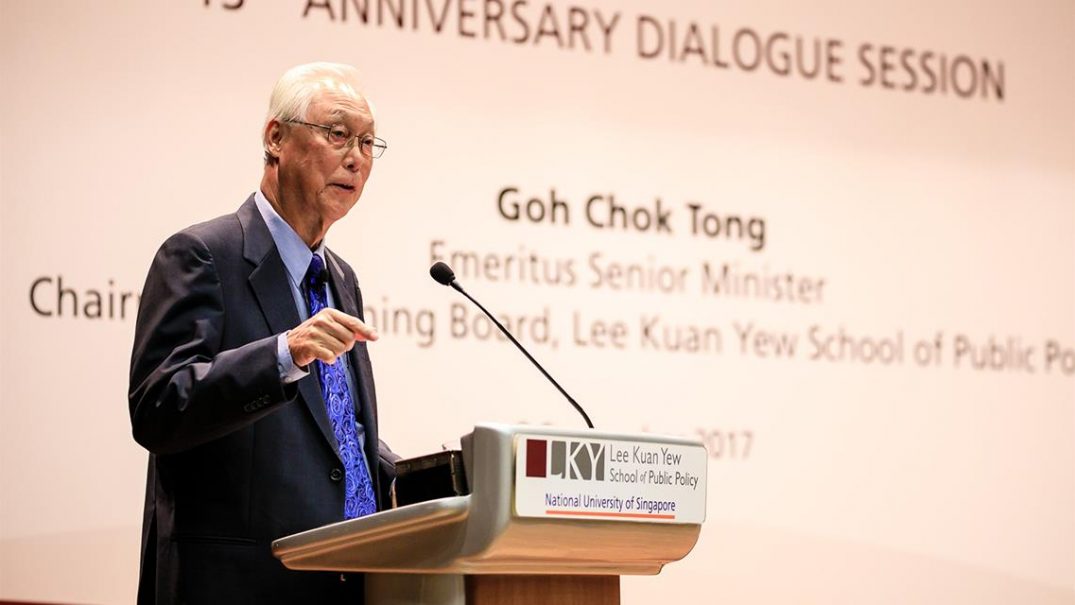If the art of government is an Olympic sport, would Singapore win?

The Lee Kuan Yew School of Public Policy can scale a new peak in public policy education, by offering Singapore's unique experience to the world as public policy becomes an increasingly urgent and relevant field of study in the face of global challenges.
But how can this be done? Emeritus Senior Minister Goh Chok Tong has four suggestions: First, by strengthening the link between theory and practice; second, by inviting currently serving civil servants to be Practice Fellows; third, by focusing on qualitative growth and providing practical viewpoints to the Government; and fourth, to emphasise the importance of political leadership in its classrooms.
The former prime minister's remarks came as he took on the new role of governing board chairman for the LKY School this year. He is replacing founding chairman Wang Gungwu, who has been at the helm of the school's board for the past 12 years.
Speaking at a dialogue session organised in conjunction with the school's 13th anniversary on September 8, he told a packed audience at the school's auditorium: The school has done very well, but in my few months here, I have sensed that we need a little change to take it to a new peak. And how we will do it is to offer more Singapore insights into the lectures.
He added: We have innovated many ground-breaking political, social and policy ideas. Foreign delegations come from all over to study the Singapore journey.
If the art of government is an Olympic sport, we would have won more than one gold medal.
Indeed the LKY School has remained a top choice for public policy students by continually developing its course offerings over the years along the same lines as what ESM Goh has envisioned for the school. Since its founding, the school has attracted more than 2,350 students from more than 80 countries, making it the most globalised public policy school in the world. Apart from having Practice and Adjunct Professors who are some of the world's top former government officials, the school has also introduced a compulsory Lee Kuan Yew School Course this year that provides an overview of Singapore's policies.
The secret of our improbable success
When asked to consider the secret of Singapore's success, ESM Goh said he wanted to focus on one important element: moral leadership. It was a subject that formed the thrust of his speech to the audience, but also one that came up more than once during the dialogue itself, which lasted slightly over an hour, as he candidly fielded questions from students, faculty members, and alumni of the school.
He described moral leadership as the most underrated aspect of successful political leadership. Moral values are not just for political leaders and office holders, but for the entire public service, he said.
If you have a public service run by bad people, the latter will corrupt and undermine the system. Conversely, if you have good public officials supported by upright political leaders, they will find a way to reform a bad system.
He added: An outstanding, ethical public service is the backbone of the Singapore story.
An example of such moral leadership was how the Government managed race relations in Singapore. In his answer to a student's question about Singapore's success in the face of ethnic strife in the region, ESM Goh said the political leadership followed one basic principle: Treat all races equally.
Although the idea was easy to understand theoretically, how to apply it in real-life was less obvious.
We have to treat all races equally. That's straightforward, nobody will dispute that. But in real life, the results of competition and meritocracy it may not end up with all the races performing equally well. When one community doesn't do as well as the other one or two communities, how then do you uplift this community to make them feel that they are part of us?
The examples ESM Goh gave were ones often used when discussing the city-state's multiracialism policies: namely, the ethnic quota in public housing and how the Government introduced the Mosque Building Fund to help Muslims afford their own places of religious worship.
But he volunteered one more insight, considering recent ongoing discussions about Singapore's reserved election for the President. Such intervention, though unpopular politically, was an important move by the Government to enhance multiracialism in Singapore.
Integrating theory and practice
Implementing Singapore's multiracialism policies among others was often a balancing act between theory and practice and when asked to choose which was harder, ESM Goh was unequivocal: Practice.
The theories are important, they must be rigorous but at the end of the day, implementation is most important. Good ideas which are poorly implemented will become bad ideas in the eyes of the people. So, we got to focus on implementation, which is to practise to be practical about your theories.
It was clear from the dialogue that this was how the senior minister believed the LKY School could benefit its students the most.
While it was important to have rigorous teaching in public policy theories, the school's Practice Professors, who have deep experience in public service, could also impart their real-life experiences, integrated within their academic lectures.
And the new Practice Fellows could do the same, since they would still be currently working in their jobs. Get them to come and share what they are doing, said ESM Goh. Bring the lessons alive. We are dealing with real-life issues today.
This integration of theories and practice will set the school apart from other public policy schools, he said.
This is an event coverage piece written for the Lee Kuan Yew School of Public Policy's 13th Anniversary event by Yen Feng, Dialogue Session with Emeritus Senior Minister Goh Chok Tong'. You can view the full Dialogue Session on our YouTube channel.